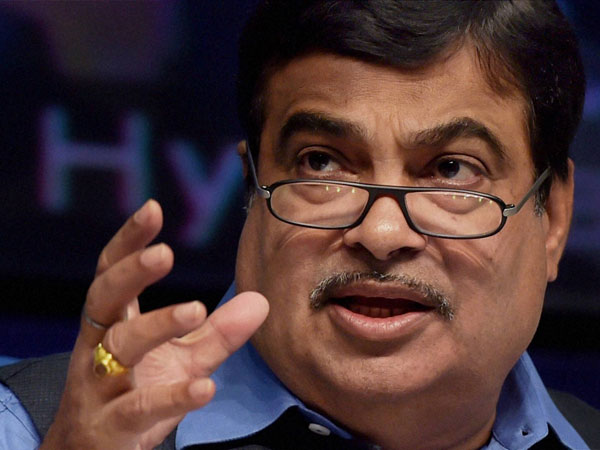Gadkari says 2019 focus will be on creating world-class expressways network
It was saddled with many stuck projects and several big players faced the risk of getting blacklisted amid a big financial quagmire, but the mess got cleared eventually as the year 2018 progressed and the minister at the helm says it also helped banks save over Rs 3 lakh crore from becoming NPAs.
The focus in 2019 now would be to build a network of “world-class expressways”, Road Transport and Highways Minister Nitin Gadkari said.
According to him, the one formula that worked to roll out 99 per cent of stalled projects was “negotiations and marathon meets to iron out issues instead of mad rush to black-list or brand players as offenders.”
He said ‘habitual defaulters’ and ‘wrongdoers’ should certainly be be branded ‘offenders’ but caution should be exercised for those with a good past record of delivering projects and this was done precisely in 2018 to re-start the stuck projects.
The National Highways Authority of India (NHAI), at the fag end of 2017, had debarred a number of major players like Larsen & Toubro, HCC and Essel Infra from bidding for projects for defaults. But soon after, Gadkari put on abeyance the blacklist order and initiated marathons meetings with bankers, players and other stakeholders throughout the first half of the 2018.
“As many as 403 highway projects worth Rs 3.85 lakh crore were stalled and were on the verge of becoming NPAs. We initiated negotiations and held marathon meeting with bankers and companies. Prime Minister Narendra Modi and Finance Minister Arun Jaitley came with help and 22 cabinet decisions regarding policies for the sector were taken and the ultimate result was saving of over Rs 3 lakh crore NPAs of banks,” Gadkari told PTI in an interview.
“If we had gone ahead to declare such players as offenders, not only the same would have turned NPAs but would have resulted in huge losses to the sector,” he said.
In 2019, the focus of the ministry will be on creating a world-class network of expressways, after delivering of country’s first express highway by the government – Eastern Peripheral Expressway (EPE), built in a record time of 500 days.
The prime minister in May 2018 inaugurated the 135 km EPE — India’s first green and smart highway — built at a cost of Rs 11,000 crore and lit by solar power besides provisions of rain water harvesting, auto challan system and intelligent highway traffic management system.
After completion of 14-lanes 9 km first leg of Rs 7,500 crore Delhi Meerut Expressway, “a dozen more expressways” are on the anvil and that will improve the sector drastically.
“We will complete the work till Meerut” by April, the minister said.
Besides, land acquisition for Bangalore-Chennai Expressway has been done while contract has been awarded for Rs 44,000 crore Vadodara-Mumbai stretch of Rs 1 lakh crore Delhi-Mumbai new expressway.
He said the tender for Jaipur-Gurgaon stretch will be out soon.
Asserting that work worth Rs 10 lakh crore has been done across highways, shipping, ports and inland waterways, the minister said: “Now we are aiming to award work for Rs 6,000 km under Bharatmala initiative.”
The government in October 2017 had approved a mega plan to build 83,677 km of highways in five years at a cost of about Rs 7 lakh crore which includes the ambitious Bharatmala project.
The total length of National Highways (NHs) has been enhanced to 1.31 lakh km at present from 91,287 km earlier.
Efforts are also on to complete all pending works including a highway through Uttarakhand for making the Kailash-Mansarovar Yatra easy and about 70 per cent of the work has been done.
The famous pilgrimage place can be reached right now only through the arduous Lipulekh Pass route and Nathu La route, opened by China in 2015.
Another key area of focus will continue to be running vehicles on alternative fuel and electricity to cut down on India’s huge crude imports.
Gadkari said bio-fuel and electricity are important cost-affective substitutes and a fleet of 1,000 electric buses is on the anvil in Maharashtra alone.
He claimed the work done in highways in last four years, exceeds the work done in the sector in the last fifty years.
The Road Transport and Highways Ministry has built 5,759 km of national highways till November this financial year against a target of construction of 10,000 km.
National Highways are the arterial roads of the country for inter-state movement of passengers and goods. They traverse the length and width of the country connecting the National and State capitals, major ports and rail junctions and link up with border roads and foreign highways.
While highways and expressways constitute only about 1.7 per cent of the length of all roads, they carry about 40 per cent of the road traffic.
Government think-tank Niti Aayog has suggested a host of measures for the road sector, including expanding the size of public fleet, augmenting highways network and road capacity, improving regulatory frameworks for better compliance and safety, among others.
Courtesy: PTI
—————





